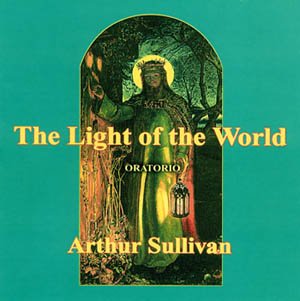 |
Arthur SULLIVAN
The Light of the World with libretto and notes |
Thanks to a handful of passionate advocates, Sullivan's non-Gilbertian works are re-emerging - some, perhaps, blinking with surprise - into the light of day. Marco Polo's series of symphonic and incidental theatre scores has revealed a wealth of marvellous music; and although some of the late stage works have realised as many fears as hopes, even the notorious "Ivanhoe" has been rehabilitated by Pearl's CD issue of the spirited Edinburgh performance under David Lyle. Sullivan's theatrical vibrancy, orchestral skill and melodic genius command more respect now than at any time since his death over 100 years ago.
The oratorios and cantatas linger more coyly in the shadows. Remnants of the anti-macassar complex persist, and such marmoreal works as "The Prodigal Son", "The Light of the World" and "The Martyr of Antioch" suffer horribly to modern ears from their aura of faded piety. Will our own Holy Minimalists sound equally compromised in another hundred years? The fact that Sullivan's epics were written for large choral festivals reduces the speed of proceedings to a snail's pace, and the total impact is the musical equivalent of a long, lugubrious soak in scented bathwater.
In its time "The Light of the World" shone forth proudly enough. Sullivan was commissioned by the Birmingham Festival to provide a full-length oratorio, duly premiered in 1873 and rapidly taken up by large choral societies around the country. The young lion's ambition was evident in his choice of subject and texts - his contemplative two-part life of Christ, with words drawn wholly from the Bible, clearly laid down a gauntlet to Handel's "Messiah". His choice of a baritone Jesus would have had Bachian resonance. His musical style, full of highly respectable choral hymns and fugues, comfortable harmonies and soothing solos, may be best described as mechanised Mendelssohn.
Only rarely in the course of this ponderous two and three-quarter hour progress does the vital composer of "The Tempest" and the "Irish" Symphony surface. It's hard to believe the succinct wit of "Trial by Jury" lay a mere two years in the future, and harder still to escape the conclusion that the composer who could write such mercurial music was artistically shackled by the wholly unsuitable demands of the English Oratorio style.
Sullivan is too good a composer to be wholly uninteresting, but the opportunities he gives himself here to play to his strengths are limited, and musical highlights are spread distressingly thin. "In Rama there was a voice heard" is most effective, contrasting as it does a gentle choral lament with the melismatic soprano wailing of Rachel, mourning for her children. This is a wonderful stroke of musical imagination - not to mention an unlikely avatar of a couple of numbers from Philip Glass's "Hydrogen Jukebox"! Of the rest, the sequence for Mary and the Angel after the crucifixion in Part 2 (soprano and contralto) has an impassioned dignity which raises the musical temperature briefly. In particular, the contralto's deeply felt solo "God shall wipe away all tears" deserved its huge popularity. The once ubiquitous choral hymn "Yea, though I walk through the valley of the shadow of Death" did not.
Though this 3-CD issue is far from ideal, the miracle is that it should have been produced at all. What we get is an edited and slightly abridged version of last year's Sullivan Centenary performance of the work in Liverpool Cathedral, with numerous amateur adult and childrens' choirs and good professional soloists - the light and mellifluous contralto of Adrienne Murray is particularly taking - under the direction of John Bethell. Despite significant choral blemishes, the performance does enough to give us a fair impression of the work. The organ reduction of the orchestral score is heroically managed by David Houlder, but hardly helps vary the apparently monotonous texture of Sullivan's score. Inevitably, given the circumstances, there is a fair amount of extraneous noise, and the cavernous acoustic of the Cathedral adds to the general sense of swimming bath imprecision; but Raymond J. Walker's recording is clear enough, whilst his notes and presentation of the set are admirable, including full libretto, graphics and track listings.
This set will be self-recommending to Sullivan aficionados. For many of us, however, hearing the antediluvian "Light of the World" will make us look forward all the more eagerly to the imminent commercial issue of "The Golden Legend" of 1886, a much fleeter-footed work written when the composer was at the height of his dramatic powers.
Christopher Webber
CONTACT DETAILS
£25 + £1.50 p&p (UK), £3 p&p (USA and Canada), £4 (Australia and New Zealand). Orders and cheques to Raymond J. Walker, 6 Lindow Fold, Wilmslow, Cheshire SK9 6DT; or email raymondwalker@talktalk.net
[Overseas orders can only be processed if cheques are made out in GB Pounds]
Recorded at the NFMS Sullivan Centenary Concert, 25th November 2000, in Liverpool Cathedral